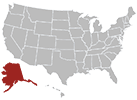
People from Alaska could consider becoming veterinary assistants if they like working with animals.
This article will present the steps needed towards this occupation as well as the salary this professional can expect having.
Page Navigation
Requirements for a Veterinary Assistant in Alaska
In Alaska, there are no state-wide requirements for a person who wants to become a veterinary assistant.
Employers, however, might ask for certifications or diplomas.
The certifications will improve your chances of developing a career in this field.
The most commonly requested document is the high school diploma or GED.
Some employers could ask for an associate’s degree in the field and even for a NAVTA credential.
Veterinary Assistant Employment and Job Duties
To improve your chances of getting a better-paid position, you should consider completing an internship as well, not just meet the requirements mentioned above.
Veterinary assistants work in a variety of settings.
These include:
- Veterinary clinics,
- Animal hospitals,
- Animal shelters
- Zoos
- Educational institutions
As the name suggests, a veterinary assistant helps a veterinarian with a series of tasks.
The tasks can include:
- Managing client records
- Keeping inventory count
- Instrument sterilization and sanitation
- Cage cleaning and disinfecting
- Preparing rooms for examining animals
- Preparing rooms for surgery
- Maintaining updated medical records
- Handling animal walking and exercise
Usually, depending on where you work, you will have to complete other duties.
Earning the National Certification for Veterinary Assistants
While there’s no actual need for a certification in Alaska, individuals can obtain one.
The best one to obtain is a national certificate.
If you’re interested in getting certified nationally, you first need to attend some training.
It is possible to attend classes for this profession while in high school.
Individuals can also enroll in online courses or certificate programs organized by post-secondary schools.
The classes will teach students:
- How to identify different breeds of animals
- The best ways to administer meds
- How to administer post-operative care
- Handling various breeds of animals
- Medical terminology
- Handling chemicals
You’ll have to attend between 100 and 240 hours of classroom education as well as some practice hours.
These are some schools you can check out for a program of interest.
Top 7 Schools in Alaska
| School Name | Address |
|---|---|
| ADVANCED PAIN CENTERS OF ALASKA (APCA) | 1917 Abbott Road, Suite 100, Anchorage, AK 99507 |
| ALASKA CAREER COLLEGE | 1415 E Tudor RoadAnchorage, AK |
| ALASKA NATIVE TRIBAL HEALTH CONSORTIUM (ANTHC) | 4000 Ambassador Drive, Anchorage, AK 99508 |
| ALASKA REGIONAL HOSPITAL | 2801 DeBarr Road, Anchorage, AK, 99508 |
| ILISAGVIK COLLEGE | 100 Stevenson St, Utqiagvik, AK 99723 |
| UNIVERSITY OF ALASKA | 3211 Providence DriveAnchorage, AK |
| UNIVERSITY OF ALASKA | 505 South Chandalar DriveFairbanks, AK |
To be accepted, you might have to meet a different set of requirements, depending on the school.
Online learning could be less costly as well as having fewer restrictions compared to in-person courses.
There are 2 certifications you can earn:
- Approved Veterinary Assistant (AVA)
- Certified Veterinary Assistant (CVA)
To obtain either one, you’ll need to complete a training program and then pass an exam.
The National Association of Veterinary Technicians in America (NAVTA) offers the AVA certificate.
The NAVTA certification can be obtained at 3 programs across Alaska.
Additionally, for the NAVTA certificate, you can also:
- Complete an internship – you must find employment with a veterinarian
- Obtain experiential learning – you must be working part-time
- Get certified while employed – you need permission to take the exam if you are already employed
These programs last up to 1 year, therefore you don’t need to spend a lot of time studying.
You can enroll in both full-time and distant forms of education.
For the exam you’ll need:
- Proof of completing your training
- To pay the fee
The AVA certification must be renewed every 2 years.
For this, you’ll need to pay a fee as well as continuing your education with approved classes.
Salary Information for a Veterinary Assistant in Alaska
In Alaska, there is a small number of vet assistants, but there is a steady demand for such professionals.
Average salaries in Alaska for veterinary assistants are generally higher compared to the rest of the country.
However, make sure to get certified and seek employment in larger cities if you want to earn more than your peers.
Annual Salary Range:Average Salary of Veterinary Assistants in Alaska
City Name Salary Anchorage $35,396 Juneau $35,081 Fairbanks $35,249 Sitka $34,603 Ketchikan $34,603 Kenai $34,918 Kodiak $34,918 Bethel $34,918 Wasilla $34,918 Barrow $34,772 Regional Salary in Alaska
Region Employed Avg. Annual Salary Avg. Hourly Pay Top 10% Annual Salary Bottom 10% Annual Salary Anchorage, AK 90 $40,630 $19.54 $54,820 $29,560
* Employment conditions in your area may vary.
Additional Information for Veterinary Assistants in Alaska
Most veterinary assistants will interact with pet owners and not only.
It is therefore mandatory for these professionals to also have good communication skills.
Time management is another useful ability to have for this position.




